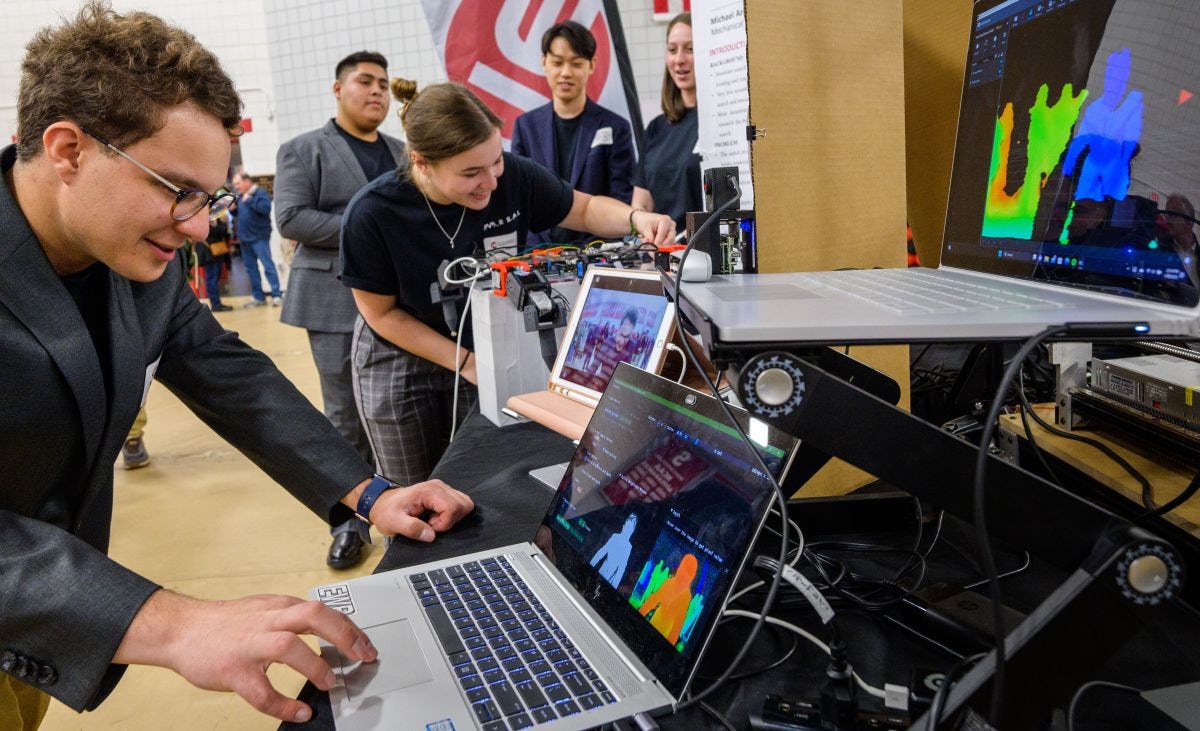
Bachelor's Degree in Cybersecurity
The Stevens bachelor's program in cybersecurity integrates the science, technology and management skills you need to design, create and apply the latest innovations in information assurance and computer security.
While cryptographers strive for the best possible solution to a security issue, the implementation of their work is too often restricted by technological limitations, cost restraints and human factors that were not considered as part of the original design process. For effective solutions to gain practical relevance, the end users must be willing and able to use the technology, and the solution must provide a significant economic benefit. The cybersecurity program at Stevens is one of the few undergraduate programs that address these issues.
Our unique program combines work in computer science and mathematics with a security-driven focus, creating the kind of interdisciplinary atmosphere that is essential to finding creative, effective solutions to issues of security and information assurance. Student seeking careers in this growing field will find the Stevens program offers a well-rounded range of courses that will prepare them for the evolving challenges they will confront in the field of cybersecurity.
A degree from Stevens will ensure that you will examine and participate in the full cycle of innovation. At Stevens, your research becomes reality through collaboration with faculty and industry partners as they bring new technologies to market.
The Stevens Advantage: Hands-On Learning, Real World Experience
At Stevens, you’ll learn to think like an engineer. Our curriculum features a hands-on course every semester that will instill you with broad, foundational knowledge, the complete fundamentals of engineering, and entrepreneurial thinking. Learn more about what makes an education from Stevens a unique experience:
Innovation Expo: an exciting design and entrepreneurship competition where students showcase their senior design prototypes and pitch business ideas
State-of-the-Art Research Labs and Facilities: build, tinker and test your designs in Stevens' MakerCenter, Prototype and Object Fabrication Lab, or numerous other research facilities
Undergraduate Research Opportunities: our research-oriented curriculum gives you in-the-lab experience while you're still an undergraduate student
More opportunities for Stevens undergraduate students include:
Double count undergraduate course credits toward a graduate degree and earn your master's faster – in just five years through Stevens' Accelerated Master's Program >
See what it's like to be a computer science student at Stevens by visiting the links below.
An NCAE-Validated Program
The Bachelor of Science program in Cybersecurity is validated through academic year 2027 by the National Centers of Academic Excellence in Cybersecurity, https://www.nsa.gov/Academics/Centers-of-Academic-Excellence/.
National Center of Academic Excellence Designation
Having met the criteria for measuring the depth and maturity of an established cybersecurity education program, Stevens Institute of Technology is designated as a National Center of Academic Excellence in Cyber Defense (CAE-CD) for the NSA-Validated Program of study through academic year 2027.
Mission
Through our world-class research in software systems, and our innovative and high-quality undergraduate, graduate and Ph.D. educational programs, we strive to be a national and world leader in developing new information technologies and educating the next generation of IT professionals and researchers.
Program Educational Objectives
These are the professional accomplishments that students are expected to have achieved three years after graduation:
Be able to acquire new skills and knowledge on one's own (Skills Development)
Be able to create solutions to complex problems in secure system design (Skills Application)
Be proficient in both oral and written technical communication (Communication)
Be effective as either a member or a leader of a small team (Teamwork)
Be able to evaluate the impact of one's work on the intended users and on society (Impact)
Student Outcomes
Student outcomes are measurable goals for the learning that takes place during a student's time in the program. These narrow statements describe what students are expected to know and be able to do by the time of graduation, relating to the skills, knowledge, and behaviors that students acquire in the program:
An ability to apply knowledge of computing and mathematics appropriate to the discipline (Apply)
An ability to analyze a problem and identify and define the cybersecurity requirements appropriate to its solution (Analyze)
An ability to design, implement, and evaluate a computer-based system, process, component, or program to meet desired cybersecurity needs in the face of current, emerging, and potential threats (Define)
An ability to function effectively on teams to accomplish a common goal (Teamwork)
An understanding of professional, ethical, legal, security and social issues and responsibilities (Responsibility)
An ability to communicate effectively with a range of audiences (Communication)
An ability to analyze the local and global impact of cybersecurity on individuals, organizations and society (Impact)
Recognition of the need for and an ability to engage in continuing professional development (Professional Development)
An ability to use current techniques, skills, and tools necessary for cybersecurity practice (Currency)
An ability to apply mathematical foundations, algorithmic principles, and computer science theory in the modeling and design of secure computer-based systems in a way that demonstrates comprehension of the tradeoffs involved in design choices (Tradeoffs)
An ability to apply design and development principles in the construction of secure software systems of varying complexity (Construction)
Putting You on Track for Professional Success
The cybersecurity bachelor’s program develops in-demand knowledge and skills to put you on track for career success. Career opportunities include:
Security Engineer
Security Analyst
Information Security Analyst
Information Security Engineer
Network Security Engineer
Information Technology Security Analyst
Information Assurance Engineer
Senior IT Auditor
Security Administrator
Potential hiring organizations include companies like: National Security Agency, Goldman Sachs, Google, Federal Reserve, VISA, Lockheed Martin
A Tech Forward Education
Undergraduate Programs Facts & Statistics
Related Programs
Bachelor's Degree in Computer Science
The computer science bachelor’s program at Stevens teaches the fundamental problem-solving skills you need to become the next innovator and technology leader.
Bachelor's Degree in Cybersecurity
The Stevens bachelor's program in cybersecurity integrates the science, technology and management skills you need to design, create and apply the latest innovations in information assurance and computer security.






